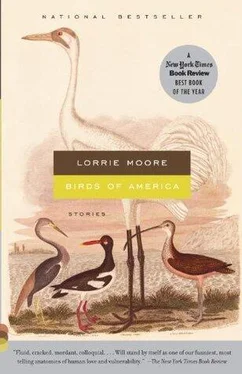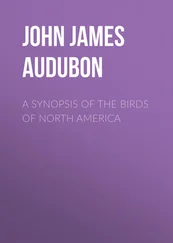Still, Lina is the one he finds himself thinking about, and carefully dressing for in the morning — removing all dry-cleaning tags and matching his socks.
Albert leads them all into the dining room and everyone drifts around the large teak table, studying the busily constructed salads at each place setting — salads, which, with their knobs of cheese, jutting chives, and little folios of frisée, resemble small Easter hats.
“Do we wear these or eat them?” asks Jack. In his mouth is a piece of gray chewing gum like a rat’s brain.
“I admire gay people,” Bill’s voice booms. “To have the courage to love whom you want to love in the face of all bigotry.”
“Relax,” Debbie murmurs, nudging him. “It’s only salad.”
Albert indicates in a general way where they should sit, alternating male, female, like the names of hurricanes, though such seating leaves all the couples split and far apart, on New Year’s Eve no less, as Bill suspects Albert wants it.
“Don’t sit next to him — he bites,” says Bill to Lina as she takes a place next to Albert.
“Six degrees of separation,” says Debbie. “Do you believe that thing about how everyone is separated by only six people?”
“Oh, we ’re separated by at least six, aren’t we, darling?” says Lina to her husband.
“At least.”
“No, I mean by only six,” says Debbie. “I mean strangers.” But no one is listening to her.
“This is a political New Year’s Eve,” says Albert. “We’re here to protest the new year, protest the old; generally get a petition going to Father Time. But also eat: in China it’s the Year of the Pig.”
“Ah, one of those years of the Pig,” says Stanley. “I love those.”
Bill puts salt on his salad, then looks up apologetically. “I salt everything,” he says, “so it can’t get away.”
Albert brings out salmon steaks and distributes them with Brigitte’s help. Ever since Albert was denied promotion to full-professor rank, his articles on Flannery O’Connor (“A Good Man Really Is Hard to Find,” “Everything That Rises Must Indeed Converge,” and “The Totemic South: The Violent Actually Do Bear It Away!”) failing to meet with collegial acclaim, he has become determined to serve others, passing out the notices and memoranda, arranging the punch and cookies at various receptions. He has not yet become very good at it, however, but the effort touches and endears. Now everyone sits with their hands in their laps, leaning back when plates are set before them. When Albert sits down, they begin to eat.
“You know, in Yugoslavia,” says Jack, chewing, “a person goes to school for four years to become a waiter. Four years of waiter school.”
“Typical Yugoslavians,” adds Lina. “They have to go to school for four years to learn how to serve someone.”
“I’ll bet they do it well,” Bill says stupidly. Everyone ignores him, for which he is grateful. His fish smells fishier than the others — he is sure of it. Perhaps he has been poisoned.
“Did you hear about that poor Japanese foreign student who stopped to ask directions and was shot because he was thought to be an intruder?” This is Debbie, dear Debbie. How did she land on this?
“Oh, God, I know. Wasn’t that terrible?” says Brigitte.
“A shooting like that really makes a lot of sense, too,” says Bill, “when you think about how the Japanese are particularly known for their street crime.” Lina chortles and Bill pokes at his fish a little.
“I guess the man thought the student was going to come in and reprogram his computer,” says Jack, and everyone laughs.
“Now is that racist?” asks Bill.
“Is it?”
“Maybe.”
“I don’t think so.”
“Not in any real way.”
“It’s just us.”
“What’s that supposed to mean?”
“Would anyone like more food?”
“So Stanley,” says Lina. “How is the research going?”
Is this absent querying or pointed interrogation? Bill can’t tell. The last: time they were all together, they got into a terrible discussion about World War II. World War II is not necessarily a good topic of conversation generally, and among the eight of them, it became a total hash. Stanley yelled, Lina threatened to leave, and Brigitte broke down over dessert: “I was a little girl; I was there,” Brigitte said of Berlin.
Lina, whose three uncles, she’d once told Bill, had been bayoneted by Nazis, sighed and looked off at the wallpaper — wide pale stripes like pajamas. It was impossible to eat.
Brigitte looked accusingly at everyone, her face swelling like a baked apple. Tears leaked out of her eyes. “They did not have to bomb like that. Not like that. They did not have to bomb so much,” and then she began to sob, then choke back sobs, and then just choke.
It had been a shock to Bill. For years, Brigitte had been the subject of his skeptical, private jokes with Albert. They would make up fake titles for her books on European history: That Kooky Führer and Hitler: What a Nutroll! But that evening, Brigitte’s tears were so bitter and full, after so many years, that it haunted and startled him. What did it mean to cry like that— at dinner ? He had never known a war in that way or ever, really. He had never even known a dinner in that way.
“Fine,” says Stanley to Lina. “Great, really. I’m going back next month. The small-head-size data is the most interesting and conclusive thus far.” He chews his fish. “If I got paid by the word, I’d be a rich man.” He has the supple, overconfident voice of a panelist from the Texaco Opera Quiz.
“Jack here gets paid by the word,” says Bill, “and that word is Next? ” Perhaps Bill could adroitly switch the subject away from nuclear devastation and steer it toward national health plans. Would that be an improvement? He remembers once asking Lina what kind of medicine Jack practiced. “Oh, he’s a gynecological surgeon,” she said dismissively. “Something to do with things dropping into the vagina.” She gave a shudder. “I don’t like to think about it.”
Things dropping into the vagina . The word things had for some reason made Bill think of tables and chairs, or, even more glamorously, pianos and chandeliers, and he has now come to see Jack as a kind of professional mover: the Allied Van Lines of the OB-GYN set.
“After all this time, Bill is still skeptical about doctors,” Jack now says.
“I can see that,” says Stanley.
“I once had the wrong tonsil removed,” says Bill.
“Are you finding a difference between Hiroshima and Nagasaki?” persists Lina.
Stanley turns and looks at her. “That’s interesting that you should ask that. You know, Hiroshima was a uranium bomb and Nagasaki a plutonium. And the fact is, we’re finding more damaging results from the uranium.”
Lina gasps and puts down her fork. She turns and looks in an alarmed way at Stanley, studying, it seems, the condition of his face, the green-brown shrapnel of his dried acne cysts, like lentils buried in the skin.
“They used two different kinds of bombs?” she says.
“That’s right,” says Stanley.
“You mean, all along, right from the start, this was just an experiment? They designed it explicitly right from the beginning, as something to study ?” Blood has rushed to her face.
Stanley grows a little defensive. He is, after all, one of the studiers. He shifts in his chair. “There are some very good books written on the subject. If you don’t understand what happened regarding Japan during World War Two, you would be well advised to read a couple of them.”
“Oh, I see. Then we could have a better conversation,” says Lina. She turns away from Stanley and looks at Albert.
Читать дальше












